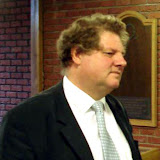We often get the wrong idea about the Holy Spirit, “the Comforter”. That word derives simply from the Latin which means the strong one alongside which is itself a literal translation of the Greek parakletos. But in our day the word comforter conjures up a kind of security which is very far from what the Holy Spirit offers. Indeed it is only when we have left the snug foetal position, safely curled up in the womb of our water based pre-natal state that the Holy Spirit comes into His own. Nicodemus was told he had to be born again: to move from a water based world to a spirit based world. To be born is dangerous: it means leaving the safety of the warm, dark, hidden place and coming out into the world – into the light, into the cold, to risk exposure to all sorts of dangers and ultimately to become independent.
When the Holy Spirit came upon them the disciples were reborn: they left the relative security of their hide-out in the upper room. The door was now opened and out they went into the street. They abandoned the security of silence for the risk of witnessing. The direct result of the gift of the Holy Spirit was that they soon found themselves in front of the authorities for breaches of the peace. The Holy Spirit offered no security; instead it exposed them as witnesses. It took them beyond their comfort zone and some of them to death and persecution.
In John’s gospel we see why. Unfortunately the word advocate – the modern translation of parakletos tends to be linked with defence rather than prosecution. In our child protection policies we have advocates to whom children can go for comfort, advice and ultimately protection. The way Jesus describes the work of the Spirit shows that it is more about prosecution than defence. It is the power of conviction. It drives the church on to the attack. It shows the world that it is wrong about sin, wrong about Jesus and complacent about judgment. Some comforter! The strong one alongside is elsewhere described as the “Sword of the Spirit”. It is an encourager “pour encourager les autres”.
The Spirit is also the great communicator. We often think we need to have silence for the gentle dove-like spirit to appear among us. But the Spirit came in anything but silence at Pentecost. It’s arrival was marked by those two deadly accomplices in mayhem – fire and wind. Flame, accompanied by wind is the great communicator. Just hold a piece of paper close to a candle and see how the flame leaps across the gap to communicate with the paper. Watch a forest fire in its full, fearsome unstoppability. Driven by the wind it leaps across gaps with a terrifying desire to communicate. And so as soon as they got into the street the apostles began to speak and the great communicator got the message across. Even language was no barrier. Far from creating a feel good factor within the upper room the Spirit broadened out their community until in one day it now embraced 15 different cultures. And so the Spirit took these Galileans outside their comfort zone in that it exposed them to new ways of thinking and new styles of living. For them it was bad enough being in
Yet the Spirit is also a spirit of unity. Those language groups that were dispersed as a result – so the story went – of the failure of the
I'm sorry but this is my last blog for a few weeks. I'm having a break.
